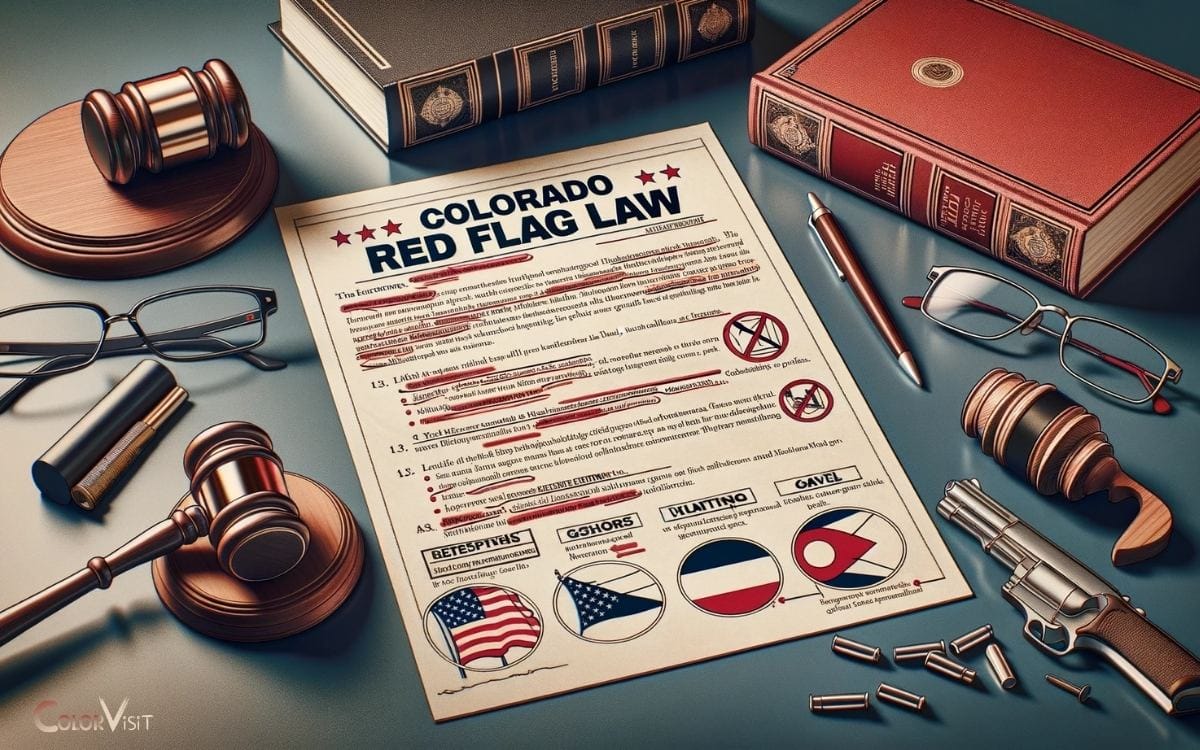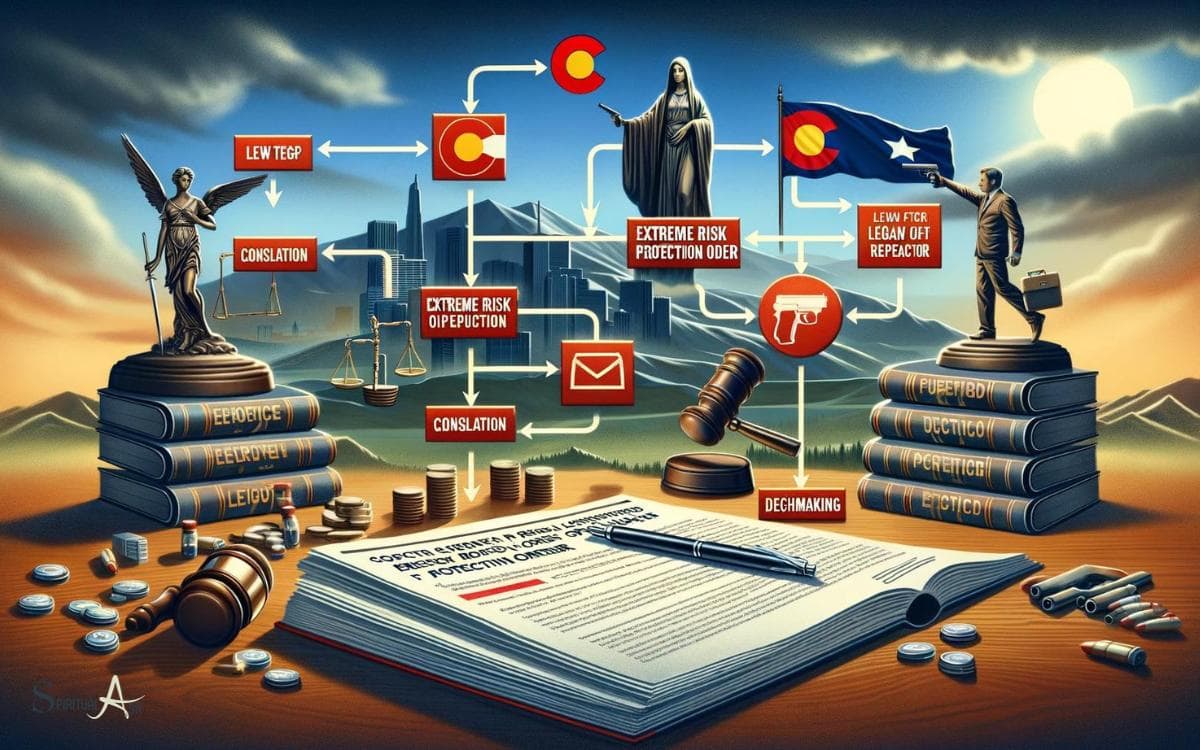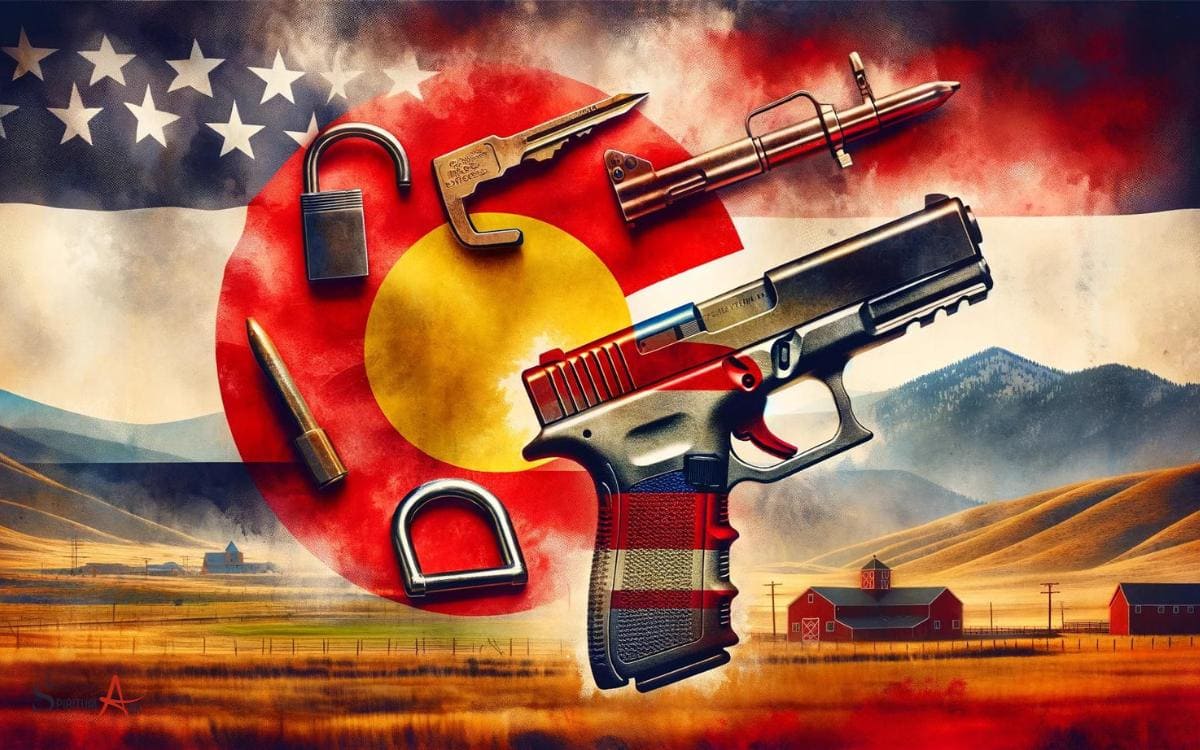Colorado Red Flag Law Explained: Innovative Legislation!
The Colorado Red Flag Law is an innovative legislation that impacts firearm possession in the state, providing a process for obtaining an Extreme Risk Protection Order (ERPO).
The Colorado Red Flag Law is a piece of legislation that aims to enhance safety and justice. It primarily deals with firearm possession and has been the subject of numerous legal challenges and debates.
The law allows for the obtaining of an Extreme Risk Protection Order (ERPO), a tool that can be used to temporarily remove firearms from individuals deemed a risk to themselves or others.
For example, if a person displays signs of being a threat to themselves or others, a family member or law enforcement officer can petition for an ERPO.
The court then reviews the case, and if the order is granted, the person must surrender their firearms until the order is lifted.
The Colorado Red Flag Law is a significant step towards addressing gun violence, balancing individual rights with community safety.
Key Takeaway
Background of the Colorado Red Flag Law
The Colorado Red Flag Law, officially known as the Extreme Risk Protection Order (ERPO), was enacted in March 2020.
- This innovative legislation allows family members, household members, or law enforcement to petition the court for a temporary removal of firearms from individuals deemed to be a significant risk to themselves or others.
- The ERPO aims to prevent gun violence and promote safety by providing a legal framework to intervene when there are warning signs of a potential threat.
This law reflects a proactive approach to public safety, addressing concerns about individuals in crisis who may pose a risk of harm.
Provisions and Criteria for ERPO
Approved petitioners, including family members, household members, or law enforcement, must meet specific criteria outlined in the Colorado Red Flag Law, known as the Extreme Risk Protection Order (ERPO).
- The criteria require the petitioner to provide evidence of the respondent’s recent behavior that poses a significant risk of personal injury to themselves or others.
- This evidence can include documented threats or acts of violence, substance abuse issues, or recent acquisition of firearms.
- Additionally, the petitioner must demonstrate that less restrictive alternatives have been considered and found to be insufficient to mitigate the risk.
- The ERPO provisions also include measures for a fair and timely hearing, ensuring due process for the respondent.
These criteria aim to balance the protection of individuals while respecting their constitutional rights, fostering an innovative approach to risk assessment and intervention.
Process for Obtaining an ERPO
The process for obtaining an Extreme Risk Protection Order (ERPO) involves several key steps:
- Filing a Petition: Any concerned individual, such as a family member or law enforcement officer, can file a petition with the court outlining the specific reasons for seeking an ERPO.
- Court Review: Once the petition is filed, the court will review the evidence provided and may issue a temporary ERPO if it is deemed necessary to prevent imminent risk.
- Full Hearing: A full hearing will then be scheduled, typically within a few weeks, where the petitioner must provide clear and convincing evidence to support the need for an ERPO.
This streamlined process ensures that ERPOs are obtained efficiently and with a focus on innovation in risk assessment and prevention.
Impact on Firearm Possession
The implementation of Colorado’s Red Flag law raises concerns about the potential risk of firearm confiscation.
- It also raises concerns about the protection of legal due process.
- Furthermore, it raises concerns about the role of mental health evaluations in determining firearm possession.
- These points are crucial in understanding the practical implications of the law and its impact on individuals’ Second Amendment rights.
Examining the interplay of these factors provides insight into the complexities surrounding firearm possession under the Red Flag law.
Risk of Confiscation
The implementation of the Colorado red flag law poses a potential risk of firearm confiscation, and its impact on firearm possession is a matter of significant concern for gun owners and advocates.
The following points highlight the potential impact:
- Loss of Property: Gun owners may face the confiscation of their firearms based on court orders, leading to the potential loss of valuable property.
- Innovative Storage Solutions: There is a growing demand for innovative firearm storage solutions that offer security while ensuring quick access and compliance with red flag laws.
- Legal Challenges: The risk of confiscation raises concerns about legal battles to reclaim seized firearms, leading to potential financial and emotional strain.
- Technology Solutions: Innovative legal tech solutions could emerge to assist gun owners in navigating the complex legal landscape and reclaiming confiscated firearms.
- Psychological Impact: The fear of confiscation may impact gun owners’ mental well-being, prompting the need for innovative mental health support tailored to this demographic.
Mental Health Evaluations
Assessing the mental health of individuals plays a crucial role in determining their eligibility for firearm possession under the Colorado red flag law.
Mental health evaluations are conducted by licensed mental health professionals to gauge an individual’s capacity for responsible firearm ownership.
The impact of mental health on firearm possession under the red flag law includes:
- Early Intervention: By identifying individuals who may pose a risk to themselves or others due to mental health issues, early intervention measures can be implemented to prevent potential harm.
- Access to Support Services: Those flagged through mental health evaluations can be connected with support services and resources to address their mental health concerns, promoting overall well-being.
- Risk Mitigation: The evaluation process helps in mitigating the risk of firearm-related incidents by ensuring that individuals with severe mental health issues do not have access to firearms.
Legal Challenges and Controversies
Amid the implementation of the Colorado Red Flag Law, legal challenges and controversies have arisen regarding its constitutionality and potential impact on due process rights.
- Critics argue that the law may infringe upon the Second Amendment rights of individuals and could lead to potential misuse through false accusations or inadequate evidentiary standards.
- The law also raises concerns about the potential for law enforcement encounters to escalate, posing risks to both officers and individuals involved.
- Additionally, there are debates surrounding the lack of mental health treatment provisions within the law, which some argue could exacerbate rather than alleviate the underlying issues.
Proponents, however, assert that the law is a necessary tool for preventing gun violence and protecting individuals from harm.
As legal challenges unfold, the ultimate resolution will significantly shape the law’s impact and future.
Conclusion
The Colorado Red Flag Law allows for the temporary removal of firearms from individuals who are deemed a risk to themselves or others.
Since its enactment in 2020, over 100 ERPOs have been issued in the state, demonstrating the impact and reach of this legislation.
Despite legal challenges and controversies, the law continues to be implemented and enforced, with both support and opposition from various stakeholders.






